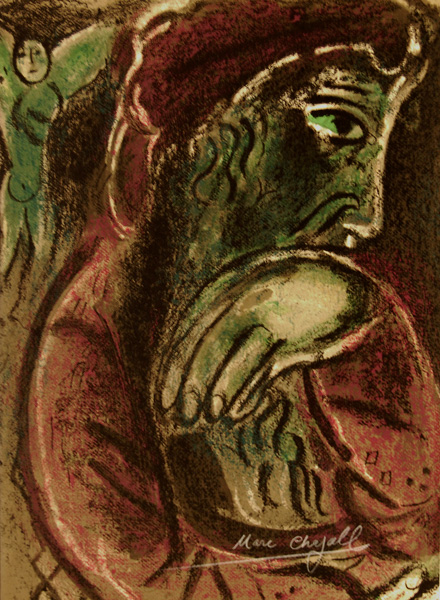I guess a more rational name would be Job and Lazarus.
Job 29:1, 30:1-2, 16-31
1Job again took up his discourse and said:
1“But now they make sport of me, those who are younger than I, whose fathers I would have disdained to set with the dogs of my flock. 2What could I gain from the strength of their hands? All their vigor is gone.
16“And now my soul is poured out within me; days of affliction have taken hold of me. 17The night racks my bones, and the pain that gnaws me takes no rest. 18With violence he seizes my garment; he grasps me by the collar of my tunic. 19He has cast me into the mire, and I have become like dust and ashes. 20I cry to you and you do not answer me; I stand, and you merely look at me. 21You have turned cruel to me; with the might of your hand you persecute me. 22You lift me up on the wind, you make me ride on it, and you toss me about in the roar of the storm. 23I know that you will bring me to death, and to the house appointed for all living.
24“Surely one does not turn against the needy, when in disaster they cry for help. 25Did I not weep for those whose day was hard? Was not my soul grieved for the poor? 26But when I looked for good, evil came; and when I waited for light, darkness came. 27My inward parts are in turmoil, and are never still; days of affliction come to meet me. 28I go about in sunless gloom; I stand up in the assembly and cry for help. 29I am a brother of jackals, and a companion of ostriches. 30My skin turns black and falls from me, and my bones burn with heat. 31My lyre is turned to mourning, and my pipe to the voice of those who weep.
John 11:1-161Now a certain man was ill, Lazarus of Bethany, the village of Mary and her sister Martha. 2Mary was the one who anointed the Lord with perfume and wiped his feet with her hair; her brother Lazarus was ill. 3So the sisters sent a message to Jesus, “Lord, he whom you love is ill.” 4But when Jesus heard it, he said, “This illness does not lead to death; rather it is for God’s glory, so that the Son of God may be glorified through it.” 5Accordingly, though Jesus loved Martha and her sister and Lazarus, 6after having heard that Lazarus was ill, he stayed two days longer in the place where he was.
7Then after this he said to the disciples, “Let us go to Judea again.”‘ 8The disciples said to him, “Rabbi, the Jews were just now trying to stone you, and are you going there again?” 9Jesus answered, “Are there not twelve hours of daylight? Those who walk during the day do not stumble, because they see the light of this world. 10But those who walk at night stumble, because the light is not in them.” 11After saying this, he told them, “Our friend Lazarus has fallen asleep, but I am going there to awaken him.” 12The disciples said to him, “Lord, if he has fallen asleep, he will be all right.” 13Jesus, however, had been speaking about his death, but they thought that he was referring merely to sleep. 14Then Jesus told them plainly, “Lazarus is dead. 15For your sake I am glad I was not there, so that you may believe. But let us go to him.” 16Thomas, who was called the Twin, said to his fellow disciples, “Let us also go, that we may die with him.”
These passages are horrible. Job describes how he is suffering, and there is no one who will hear him. Instead he is mocked. He is now mourning for the life he had, and he cannot see any justice. The rules he lived by seem null and void. He has no reward for right living.
And Mary and Martha are left grieving for three days. Lazarus is dead.
We do not know why as of this date. In fact, Job never learns why. He learns he is limited. We are less limited because we know the next part: Lazarus was raised. But to prove he was truly dead, he had to be in the tomb, rotting. Job allows us to see that you can be despairing, angry, arguing with God, and keep your integrity. He is described as the righteous man — and prays that the companions who spoke for God will be forgiven by him.
And those who reduce our faith to something that allows our requests to be fulfilled misses the idea that God is in charge. We simply do not know what is for our long term good. But we know we suffer, and we cannot disengage from this pain. We take our emotional and historical weather with us.

